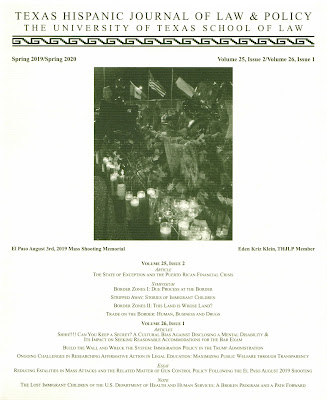One legislator, an African-American woman, reacted with manifest hostility, as if we sought outright to deprive persons of color of access to education. I wish she would have engaged with us rather than fighting the bill behind closed doors. It probably would have surprised her to learn that I was motivated specifically by an accusation leveled by an African-American advocacy group. The group alleged, inter alia, that higher ed was using affirmative action to boost enrollment profiles, for PR and accreditation purposes, but then failing to support those enrolled students' success on state campuses.
I didn't know, and to this day don't know, whether the group's accusations held up as more than anecdotes. As a transparency and accountability advocate and public educator myself, charged with the responsibility of faculty governance, I wanted to know the truth. And there arose the problem: It was impossible to do the research, because the universities claimed, even in response to internal queries, that student privacy required nearly every datum about admissions to be held secret. There was no way to know what students benefited from affirmative action, nor to match those data up with how those students fared.
The access bill ultimately failed, and, to my view, the reason for that failure only made the transparency case stronger. We were not undone by objection based on equality of opportunity. We were undone because our bill, which broadly defined affirmative action, would have required disclosure of legacy admissions: that is, when a university admits an applicant because the applicant is related to an alumna or alumnus, especially one who's a donor. That kind of admissions preference is known to contribute to systemic discrimination against persons of color, not to mention aggravation of our alarming rise in America of socioeconomic disparity.
 |
| State Capitol, Little Rock, Arkansas |
The bill died. After the session, I contacted our zealous ASU opponent, that he might make good on his promise. He ignored my query and never responded.
My work on that bill fueled an ongoing interest in the interaction of access and privacy in education, especially the interaction of the federal Family Educational Rights and Privacy Act (FERPA), 20 U.S.C. § 1232g, and state freedom of information acts (FOIAs) (e.g., in 2018). In that vein, my Arkansas colleague Professor Robert Steinbuch and I have just published, Ongoing Challenges in Researching Affirmative Action in Legal Education: Maximizing Public Welfare Through Transparency, 26:1 Texas Hispanic Journal of Law & Policy 57 (2020). Here is the abstract:
The public good often depends on social science research that employs personal data. Volumes of scientific breakthroughs based on data accumulated through access to public information demonstrate the importance and feasibility of enabling research in the public interest while still respecting data privacy. For decades, reliable and routine technical methods have ensured protection for personal privacy by de-identifying personal data. Social science research into legal education and admission to the bar is presently a matter of urgent public interest and importance, requiring solid empirical analysis of anonymized personal data that government authorities possess. Social science research into the effects of affirmative action represents standard, indeed commonplace, research practice furthering the public interest, while employing established methods that minimize the risk to privacy. Yet, when seeking information regarding admissions standards and success metrics, researchers have faced remarkable headwinds from government officials. In this article, we continue to discuss a topic to which we have devoted significant professional energy: the proper balance of privacy, transparency, and accountability in researching legal education.Our research grew out of an amicus representation in 2018, alongside Professor Eugene Volokh at UCLA Law.
I'm not here naming the ASU-affiliated legislator only because, these many years later, I don't remember his name. I have no hesitation in calling him out if someone can remind me.
Pertinently, the data in question are still held secret, in Arkansas and many states. So my colleagues in FOIA research, including Professor Steinbuch, still would welcome that legislator's help. It's shameful that this fight for transparency and accountability is still under way all these years later. It's one thing to adopt a policy position and have reasoned disagreement over it. It's another thing entirely, and anathema to democracy, to insist on a policy position while willfully concealing evidence of its efficacy.


